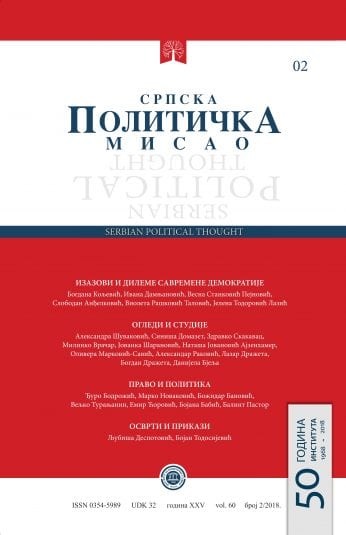Етичке опречности тезе о демократском миру
Ethical Contradictions of the Democratic Peace Thesis
Author(s): Srđan T. Korać, Nenad Z. StekićSubject(s): Ethics / Practical Philosophy, Political Philosophy, Governance
Published by: Институт за политичке студије
Keywords: Democratic Peace; deontology; consequentialism; utilitarism; imperialism; international relations
Summary/Abstract: The paper analyses the ethical contradictions inherent to the democratic peace thesis, taken from the utilitarian perspective and the duty ethics based on Kantian deontology, respectively. The authors hypothesise that a pragmatic (mis)use of the democratic peace thesis – as one of the favourite lines of legitimisation of the interventionism of the United States and other Western powers’ in the early 21st century – has been facilitated by its shaky ethical foundation undermining the cognitive, normative and practical validity of the essential assumptions of this thesis. The analysis focuses on the intellectual heritage regarding the moral philosophy of John Stuart Mill and other leading utilitarians, on the one side, and of Immanuel Kant, on the other side, now pursued by the democratic peace scholars. Since its development as a modern scientific concept conceived just before the very end of the Cold War, the democratic peace thesis has been related to the empirical research and theoretical explanation provided by the Western academicians and scholars who advocate for spreading of democracy and its values worldwide, while some justify the military campaigns against non-democratic regimes. The alleged liberal goal of spreading the zone of Kantian perpetual peace, grounded on the democratic peace thesis, shapes political discourse of old/developed democracies so as to legitimise military interventionism in failed/weak states, which induces new conflicts – not international peace and coop eration. The authors emphasise the limited ability of old/developed de mocracies to sustain the universality of liberal norms beyond the Western civilisation, which is depicted in a perverted version of the democratic peace becoming a form of liberal hegemony – Pax Americana. Being a sort of apology of the idea of a peace sustainable only within and be tween liberal democracies themselves, the democratic peace seems to represent the continuation of the intellectual legacy of the 19th centu ry imperial politics embodied in the self-satisfying image of the devel oped nations as benevolent civilisators driven by the rationality of liberal ideas. The analysis of the democratic peace thesis through the optics of the utilitarian intellectual heritage has confirmed the authors’ assump tion about the existence of strong inherent ethical contradictions such as: moral compromises made in pursuing the alleged best outcome, that is, the benefit of the greatest number; the shortcomings in calculating possi ble outcomes of a chosen foreign policy action; moral ambiguity arisen in connection with the simultaneous advocacy of the idea of internation al peace and cooperation and the eased legitimisation of the pragmatic use of violence. The examination of the validity of the democratic peace thesis through the optics of the deontology only partially confirmed the authors’ assumption of the existence of inherent ethical contradictions. Although Immanuel Kant considers nations without a constitutional or der as having less developed rational and, thus, moral ability, he sees the full achievement of international peace in the gradual implementation of indigenous social reforms in non-democratic societies; in words of John Rawls, people ought to voluntarily develop a sense of a genuine commit ment to the principles of justice that can be found in international law. The authors conclude that a renovated Kantian legacy of the democratic peace thesis might provide a solid ground for morally right reasoning needed in the decision-making about foreign policy actions driven by universal values and principles.
Journal: Српска политичка мисао
- Issue Year: 2018
- Issue No: 4
- Page Range: 95-117
- Page Count: 23
- Language: Serbian

